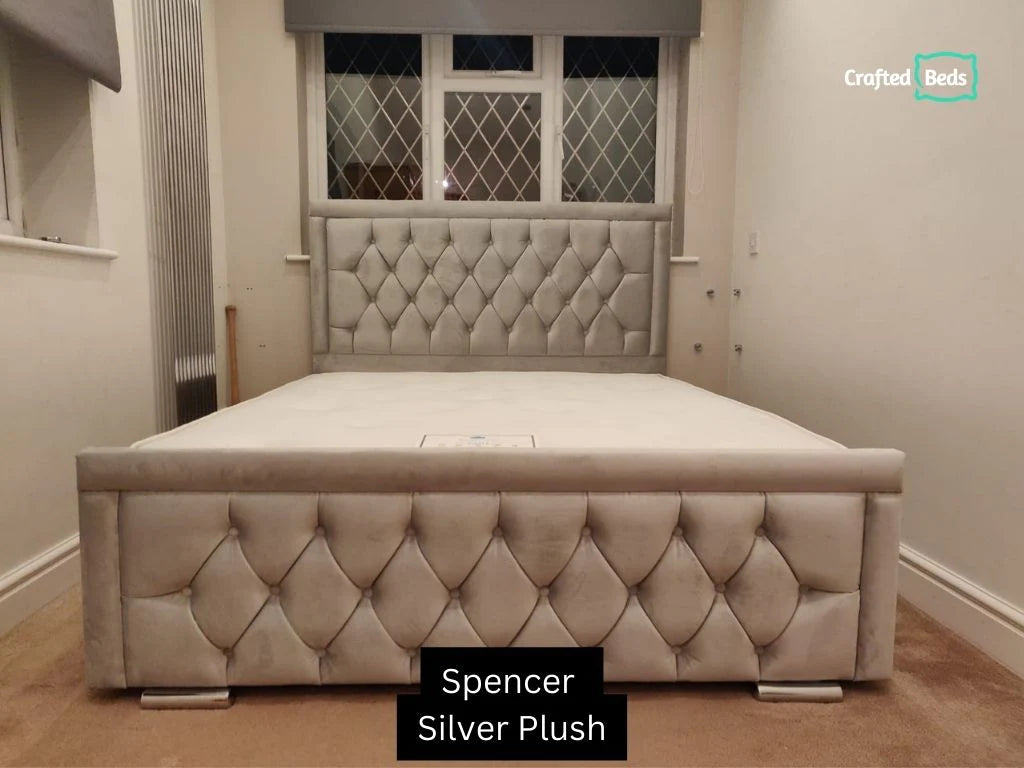We've all been there. You're in bed, ready to drift off to sleep, and then you remember... you left your phone on the nightstand. So you get up to grab it, check your messages one last time, and then put it back down. And suddenly, you can't get back to sleep.
Sound familiar? If so, you're not alone. According to Sleep Foundation, every 4 in 10 people admit to keeping their phones closed when trying to sleep. And while most of us probably know that sleeping with our phones is bad for us, we do it anyway. Why? Because we're addicted!
But the truth is, sleeping with your phone can harm your health in more ways than one. Continue reading to find out why sleeping with your phone is bad for you.
Reasons to Keep Your Phone Out of Your Bed
A study posted on Butler Hospital has shown that keeping cell phones close to you in bed can affect the quality of your sleep and even lead to stress, anxiety, and depression. Keeping your phone away from your sleeping environment is one of the best ways to ensure a good night's rest.
Here are some key reasons why you should keep your cell phone out of your bed
Disrupts Sleep Quality
It's often recommended to keep your cell phone away from the bed because the blue light emitted by devices can prevent you from resting well. According to Sleep Foundation, blue light reduces melatonin production, disrupting your circadian rhythm and making it harder to fall asleep.
Interrupts the Brain's Natural Sleep Cycle
Your cell phone is a constant companion, and it's natural to want to keep it close at all times. But when you bring your cell phone into the bedroom, especially when you sleep with it right by your head, you can negatively impact your brain's natural rem sleep cycle.
Moreover, the blue light emitted by your phone's screen has been linked to insomnia and disruption of melatonin production, which is essential for regulating the natural sleep-wake cycle. Keeping your cell phone away from you at night can help you get better quality sleep and ensure your brain's biological clock is not disturbed. Moreover, if you use your phone's alarm clock, replace it with a real alarm clock.
Affects Melatonin Production
Melatonin is a hormone that regulates our body's sleep-wake cycle. It is produced at night when our brain senses the darkness and desires sleepiness. Our cell phones emit light that disrupts melatonin production, thus making it harder to fall asleep or stay asleep throughout the night. When we keep our cell phones out of our beds, we allow our brains to produce Melatonin and thus get better sleep.
Additionally, keeping our cell phones out of our beds helps us avoid distractions and unwanted notifications when trying to relax or catch some rest. We can create healthier habits that support better sleep quality by removing the temptation.
Sounds and Alerts Cause Wakefulness
Having your cell phone in bed with you can disrupt your sleep each time it rings or vibrates. Even if the sound isn't loud enough to wake you up fully, it may still be enough to disturb your sleep cycle and make it harder for you to fall back asleep. This can lead to suboptimal sleep and make you more tired the next day.
Even if you manage to fall back asleep, your quality of sleep is likely to be less than optimal due to the disruption. To get a good night's rest, it's best to keep mobile phones out of bed altogether.
If you need an alarm in the morning, opt for one that doesn't use sounds, such as a vibrating watch or bracelet. Better yet, try to form a habit of waking up without an alarm clock at all! This will help you get the best sleep each night and have more energy during the day.
Induces Anxiety and Stress
The constant notifications from your mobile phones or social media can increase stress levels as you are constantly bombarded with stimuli. Additionally, the light from your phone can disrupt your sleep cycle and the production of Melatonin, negatively affecting the quality of your sleep.
Keeping your mobile phones far away from you at night will help to reduce this stress and allow for a more restful sleep. It also helps to keep distractions out of bed so that you can focus on relaxation before you fall asleep. Giving yourself this time to relax and unwind before bed can help you achieve much more restful sleep and reduce the anxiety of having your phone in the bedroom.
FOMO (Fear of Missing Out)
FOMO is a real phenomenon, especially when your phone is in bed. Having your phone next to you can give the illusion that you're missing out on something important or exciting if you don't check it constantly. It results in a constant feeling of anxiety and stress about not being able to keep up with what's going on.
To avoid this, it's best to keep your mobile phone out of the bedroom and refrain from using it in bed. That way, you can give yourself peace of mind by not worrying about what is happening outside your bubble.
When you use your phone before bed, stick to calming activities such as reading a book or meditating instead of scrolling mindlessly through social media. This will help you relax and sleep better while also reducing your FOMO. Plus, when you're fully rested, you can catch up on what's happening in the world when you're ready!
Interrupts Energy Levels and Cognitive Functioning
A study conducted by the World health organization has shown that mobile phones have several health risks. Because, when you keep your phone away from your bed, you avoid the disruption it can cause to your energy levels and cognitive functioning.
Additionally, nighttime cellphone use has been linked with poor sleep quality, which results in decreased energy levels during daytime hours. To reap the full benefits of a good night's rest and maintain alertness throughout the day, it's important to keep your phone away from the bedroom.
So if you're looking to optimize your energy levels and cognitive functioning, keeping your phone out of your bed is an essential first step.
Damages Eyesight
The amount of blue light that comes off a smartphone and other electronic devices (Like TV) has been proven to be more intense than sunlight and, as such, can cause permanent damage to your eyesight. It is not just the direct viewing of these devices that can be hazardous but also having them close by, especially in the dark.
Furthermore, if you typically keep your phone near your bed at night, it could wreak havoc on your vision without realizing it. To protect your vision, keeping your electronic devices as far away from your bed as possible, preferably in a different room, is best.
Can Lead to Physical Pain in the Neck and Shoulders
Studies at NIH have shown that keeping cell phones close to you in bed with you can lead to physical pain in the back, neck, and shoulders. Not only does this keep you up at night, but it also causes tension in your upper body. This can be especially true if you frequently text or scroll through social media while lying down. The unnatural positions held while using the device can cause long-term strain and even chronic fatigue.
Therefore, to avoid this, it is important to keep your phone away from the bed or use a stand or holder while using it while lying down if necessary. Taking breaks during device usage is also critical to rest your neck and shoulders. Taking care of yourself with proper posture and rest is the key to avoiding discomfort.
Tips to Get Better Sleep
Now, Let's go through some tips to help you get a good night's sleep:
Set Designated Times for Phone Use
Limiting evening phone use is an important way to improve your sleep quality. Checking emails and scrolling through social media late into the night can have a major impact on how well you sleep, so designating specific times in the day for using your phone can help ensure that your electronic devices don't interfere with restful sleep.
Establishing a regular bedtime routine can help establish healthy boundaries for yourself regarding phone use and make sure that the time leading up to sleep is more calming and restorative.
Limit Blue Light Exposure Before Bedtime
According to Sleep Foundation, limiting blue light exposure before bedtime can improve sleep quality and help alleviate difficulty falling asleep, waking up frequently throughout the night, or feeling tired even after a full night's rest. Blue light is emitted from electronic devices such as televisions, smartphones, laptops, and tablets.
The wavelength of electromagnetic radiation has been scientifically proven to suppress melatonin secretion in the brain of cell phone users, a hormone that regulates our sleep cycle. Limiting blue light exposure for at least an hour before bedtime is the best practice to prevent this from happening. This can be done by dimming the brightness on electronic devices or turning them off completely.
Turn off All Notifications at Night
Notifications are designed to be disruptive but can also impact your sleep quality. Turning off all notifications at least an hour before bedtime will free you from the distraction of incoming texts, emails, and other alerts that could keep you from getting deep, restful sleep.
Furthermore, if you're worried about missing out on something important, set your phone to silent mode and manually check for updates in the morning in addition to keeping an alarm clock. By making this simple change, you can increase your sleep quality and ensure you wake up feeling refreshed without an alarm clock and ready to take on the day!
Listen to Soothing Music or Read a Book
Listening to soothing music or reading a book before bedtime can help relax the body and mind, allowing you to get better sleep. This is because calming sounds and words can help slow your breathing, reduce stress hormones, and lower your heart rate. Moreover, studies at NIH have shown that listening to classical music for 30 minutes before bed can improve sleep quality and reduce insomnia symptoms.
Moreover, reading a book can also help to wind down from the day and relax your body into a state of restful sleep. This is because reading stimulates parts of the brain associated with relaxation and deactivation, inducing an overall calming effect.
Create a Bedtime Routine
Bedtime routines are essential for getting a good night's sleep. By setting up consistent habits and rituals before bed, you can help your body start winding down, so it is ready to rest. These routines should involve calming activities like reading, yoga, or soothing music. Start by setting a specific time for bed each evening, then plan activities that lead up to this time, such as reading a book or taking a warm bath. This will help cue your body that it's time to start getting ready for sleep.
Avoid Consuming Caffeine Late in the Day
Lastly, it's important to avoid consuming caffeine late in the day. Caffeine is a stimulant that can decrease the quality of your sleep and cause disruptions in your circadian rhythm. This can lead to anxiety, lethargy during the day, and difficulty concentrating or focusing on tasks.
Therefore, try to refrain from consuming any caffeinated drinks past mid-afternoon. If you have coffee later in the day, try limiting yourself to one small cup and opt for decaffeinated options. By avoiding caffeine late in the day, you can improve your circadian rhythm to get better sleep which will help you feel more rested and energized during the day.
FAQS
Now that you know everything about why sleeping with your phone is bad for you.Let's look at some of the frequently asked questions.
Is It Unhealthy to Sleep With Your Cell Phone?
Smartphones and screens are responsible for causing disruptions in the natural sleep-wake cycles. Blue light and transmission signal emitted by these screens also reduces the production of Melatonin, the hormone responsible for making you drowsy.
How Far Away Should Cell Phones Be When Sleeping?
It's important to keep your phone at least 3-4 feet away from your bed and putting it on airplane mode to prevent the radio waves from reaching you.
What Are the Symptoms of Phone Radiation?
Mobile phones emit radiation because of transmission signal. The main symptom of phone radiation is the thermal effect, which raises the user's body temperature. Other symptoms include headaches and brain tumors in the worst-case scenario.
Wrap Up!
To sum up, sleeping with your phone is bad for you. Not only does it increase your radiation exposure, but it can also cause disruptions in your sleep, leading to poorer quality rest and fatigue during the day. To get better sleep, try to keep your phone away from you while sleeping and avoid consuming caffeine late in the day.
Moreover, if you're looking for tips on creating the perfect sleep environment or needing advice on managing stress and anxiety, you can drift off into a peaceful sleep; Crafted Beds has the answers. So, if you're looking for tips and tricks for better sleep, check out our more best sleep health-related blogs Here!





